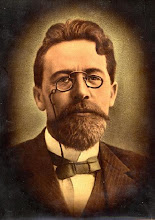Here is what Kyle and I have devised for pursuing part 3 of the assignment:
Samenesses:
All seemed to be concerned with what the misery was about. Was it about the loss of his son? The impeding loneliness? Or the indifference of the world?
Many of us noted the mysteriousness of the horse (or in other words the 'gap' presented by the horse) whether they listed the horse as gap or not.
Differences:
Some thought the misery to be solely about the son. Others thought it was his loneliness. Others thought it was the dissonance between the world and the individual.
How has reading the responses of others altered your view of the understanding or meaning of the story?
What is the overall theme of the story (the intent)?
Is it the death of his son?
Is it the loneliness Iona experiences?
Is the loneliness a product of an unfeeling ungrateful world?
Is this realist? Allegorical?
Chekhov – is he trying to present a moral, or is he describing the world as it is?
Do we understand this story based on what we know best? Our areas of 'expertise'?
Friday, February 5, 2010
Subscribe to:
Post Comments (Atom)

This is an excellent outline. There are a lot of good things we can pull out of everyone's responses to answer these questions as well as qoutes we can use to back it up. -Karen-
ReplyDeleteThe overall theme of the story is this man's sorrow and misery and anguish and it begins with the line "To whom shall I tell my grief?" which ends up being very important as it ends up being his horse. I think its great how his horse friend is the individual to whom he tells his grief. The way Chekhov wrote it makes it sound more believable and realistic, and it is also an amusing twist on the gloomy story.
ReplyDeleteI think that the story is realist and that the misery is caused from the death of his son, his loneliness without him, and the dissonance as well. All of these combined is his misery, as all those single miserable things have magnified and that is his all encompassing misery. I think that Chekhov is describing the world as it is and I would call this realism. I understood this story from its realistic setting and realistic descriptions. -Jay